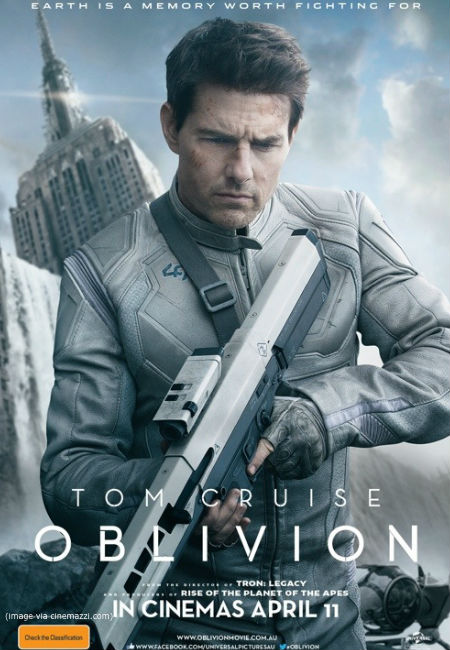Is it possible to be alive and yet not truly be fully conscious of who you are?
Or to lose some crucial part of yourself on the journey through life and not even be aware of it?
These rather grandiose but nonetheless basic questions are at the heart of Oblivion, a film by up-and-coming director Joseph Kosinski, which stars Tom Cruise, in one of the everyman roles he excels in, as Jack Harper, a man who is wrestling with just these kinds of existential dilemmas.
Only he doesn’t realise that’s what he’s doing.
At least not directly.
It’s 2077, and following a memory wipe five years earlier, a requirement if he is to perform his role as a drone maintenance worker with partner Victoria (Andrea Riseborough) on an Earth ruined by a nuclear-weapon fuelled war sixty years earlier that successfully repelled alien invaders, Jack is troubled by sporadic memories of a life lived before the conflict began.
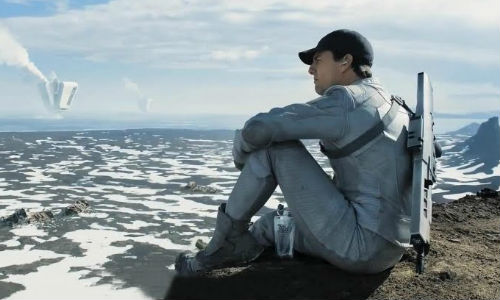
In these possible memories of a life-once-lived, he sees the same woman time and again, a woman with whom he clearly shares a close romantic bond, and the same location – the viewing platform of the now-wrecked Empire State Building.
While he rejects these on the surface as aberrations of a troubled dream state, since he couldn’t possibly have been alive so long ago, the visions he has are so visceral and real that they can’t be anything but actual memories.
As he wrestles with the contradictions inherent in the concept of two lives lived sixty years apart, one of which by definition must be false, he does his best to remain focused on finishing out his stint on Earth with his “effective team” member Victoria so he can retire to Titan, one of Saturn’s moons, where humanity has fled the post-apocalyptic devastation of modern Earth.
But try as he might to suppress these all too vivid flashbacks, he is unable to shake the sense that he is a man out of time and place, and that something, an undefinable nagging something, is wrong with his present life.
It’s an idea given short shrift by Victoria, who is unwilling to deviate in any way from their orders or the regulations that govern every minute of their existence on the platform they inhabit far up in the clouds, lest it jeopardise the reward of life on Titan that awaits them.
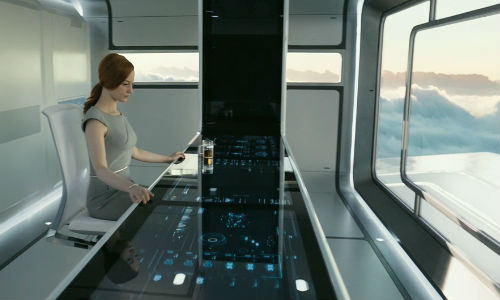
Even though Jack knows in his head that he should follow much the same course as Victoria, his heart keeps telling him there is something more that awaits them.
Quite what he doesn’t know but an inkling is given by his predilection for collecting books and LPs he finds – he finds one book, The Lays of Ancient Rome by Thomas Babington Macaulay, in the water-soaked ruins of the New York Public Library – and stashing them away in a rather ramshackle hut he has found in one of the few untouched tree-filled valleys left on the planet.
Victoria refuses to go down to the planet to see why this place matters to him so much, and tosses a plant he brings her as a romantic gesture over the balcony of their impossibly high abode (not quite the reaction he was expecting), but Jack knows, knows, somewhere deep inside that this is where he belongs.
Quite why he doesn’t know but a spur of the moment decision to recover a vintage spacecraft that crash-lands on the planet, and the recovery of the sole survivor, a female NASA astronaut Julia Rusakova (Olga Kurylenko) who is the spitting image of the woman from his dreams, spurs him on to discover who he is really is, and what, if anything, he has mysteriously forgotten.
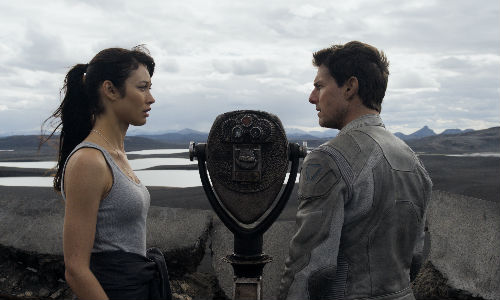
If all of that sounds a little introspective and involved, at times it is, with the narrative falling into plodding pockets of over-importance that slow things down a bit, it also lends the film a depth and substance that I honestly didn’t expect it to have.
Given the post-apocalyptic overtones of the story, which are powerfully given physical form by the visually-arresting volcanic landscapes of Iceland, and the Mad Max-like figure of Malcolm Beech (Morgan Freeman) who leads what’s left of humanity on the Earth itself, Oblivion gives every indication it is going to be some sort of restore mankind to its rightful place action thriller.
And to an extent that is true although the action sequences, such as they are, are few and far between, and almost an after thought.
It turns out the film is far more than that, choosing to dwell on high-faluting questions such as the nature of self, life and God and the way they all intersect, with the action simply an adjunct to these existential explorations.
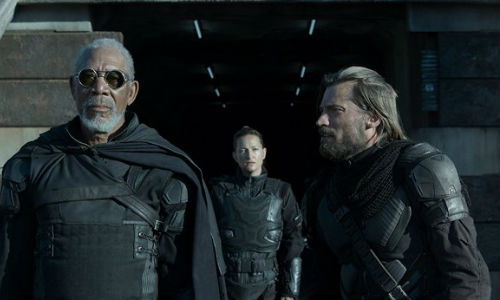
It’s clear that Joseph Kosinski’s aim was to craft an intelligent atmosphere-drenched sci-fi thriller that ticks a number of the blockbuster boxes without sacrificing its artistic soul.
And in that respect he succeeds admirably, with Oblivions drawing you into its perfectly-constructed world almost completely, all the while weaving a mystery whose resolution also turns out to be far more satisfying than expected, even if you have seen many of the tropes used in countless other sci-fi movies.
What saves Oblivion from disappearing up its own artfulness, which while impressive both visually and intellectually could have resulted in a movie so full of its own self-importance Earth itself would have collapsed under its weight (much like the moon which hangs blown to bits in the sky) is the relationship that between Jack Harper and Julia Rusakova, which acts as the emotional centrepiece of a movie which doesn’t develop many of the other relationships, save for that of Jack and Victoria, beyond cursory at best.
It is their bond that sees us through all manner of revealing plot twists, character revelations, and existential musings and carries the Oblivion, through to its rather too predictable, if audience-pleasing conclusion.
At its heart, and once the running, shouting and shooting has died down and we are left alone without our thoughts, Oblivion asks us to consider what it really means to be alive, and while it does tend to present the answers on a platter a little too quickly and ponderously at times, it is nonetheless proof positive that you can make a massive sci-fi blockbuster that doesn’t have to check its brains in at the cinema complex’s door.
